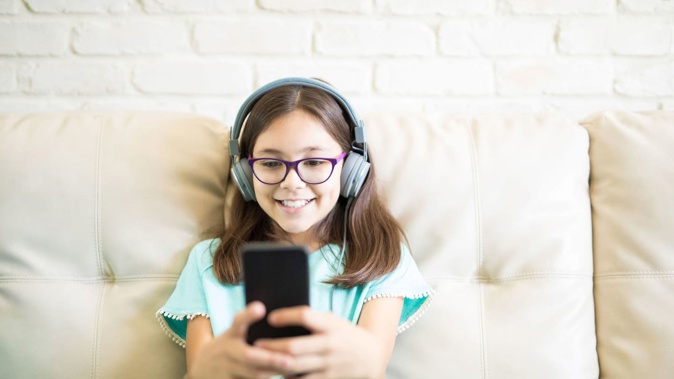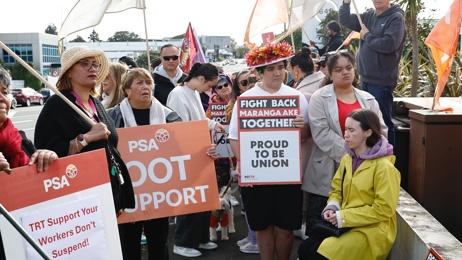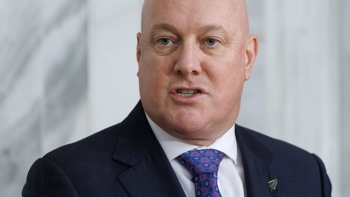
The United States government is set to ban TikTok unless the company’s owner can find a buyer, while in Australia, one state is considering a social media ban for under-16-year-olds. Should New Zealand follow suit? And should Kiwi parents be worried about their kids using TikTok? A New Zealand-based expert weighs in and shares practical tips for parents and teens.
Recent research shows Kiwi kids spend about a third of their time outside of school on screens, while a nationwide cellphone ban in New Zealand schools aims to reduce distractions in the classroom. Experts around the world fear excessive time online is negatively affecting young people’s mental health, leading to growing calls to ban or restrict social media use among kids and teens.
Social media expert Katie Brown isn’t convinced banning apps like TikTok is the answer.
Brown is the founder and CEO of Te Ao Matihiko and Social Good, as well as the representative for Facebook owner Meta in Aotearoa. She advocates for Māori in technology and led the Unite Against Covid-19 campaign during the pandemic.
“If it’s about safety, it doesn’t fix the issue that’s at the heart of it, which is that some bad actors are putting bad information out there that people can have access to on any platform,” she tells the NZ Herald.
“So, we need to really get to the heart of where those people are coming from, trying to stop that from even happening, but also equipping our young people with the tools that they need to navigate safely online.”
As Brown points out, Aotearoa famously spearheaded the Christchurch Call following the mosque attacks in 2019.
“That’s all about security provisions from all of the social media platforms around keeping the people on there safe and making sure that the content doesn’t result in something as horrific as what we’ve seen,” she explains.
“In Australia, they have concerns about the safety of younger people under the age of 16 accessing TikTok and the content that they’re accessing, and so they’re trying to get an age limit.”
But as Brown notes, the proposed ban is being pushed in only New South Wales, and won’t necessarily be effective unless the rest of the country gets on board.

Social media expert Katie Brown wants parents and caregivers to equip their young people with the tools they need to stay safe online.
In her view, a ban would lead to “underground behaviour”. “They’ll secretly go on it or they’ll go on a VPN. And so, then if they encounter content that makes them uncomfortable, who are they going to talk to about it?”
While the medium may have changed in recent decades, young people have always sought their own spaces away from adults to establish their identities and connect with one another.
“They’re going to be online, they love being online to connect with different people. We don’t talk about the good part enough, which is it’s such a good connector,” Brown says, adding that those positive aspects of social media are often overlooked.
“The best thing that people can do is bring it out in the open and have conversations with young people about what they see online and what content they’re looking at. [Then] we can strengthen our young people and equip them with all the tools to build resilience.”
So, how do you have those conversations as a parent? And how can you model healthy social media use for your kids?

Does your child know what to do if they come across negative content on social media? Photo / Alex Cairns
Talk with your kids about their online identity
Those of us of a certain age cringe when we think about photos or statuses we posted on our Facebook walls in the site’s early days. Twenty years ago, no one was thinking about their “digital footprint” — but now, Gen Alpha has the chance to learn from previous generations.
Brown advises getting your kids to think about their online identity.
“Who do you want to be online, how much of your identity are you willing to share? And then what are your strategies if you feel that you’re unsafe?”
As parents, you get to put parameters around social media use that Brown encourages.
“It might be, you can go on TikTok when you’re in the lounge, or you can’t be on it until you’re 15. Those are decisions that they [parents] need to make for the wellbeing of the young person.”
Brown notes that TikTok is aware of the registration age, and its algorithm shouldn’t send unsuitable content to a young user, and this offers “a little bit of reassurance”.
“That does not mean they can’t go and look at that stuff,” she explains. “But it does mean that the machine itself has some built-in support.”
Try ‘co-scrolling’ with your child
Brown suggests “co-scrolling” with your child — looking at social media content together.
“Scrolling together, having a look at content, reflect on that content and why you like it, and why you might not engage with some other content. So it’s creating that reflective behaviour, but also teaching the algorithm, this is some good content, give us more of that,” she explains.
This helps promote positive social media use, she says.
“It means that social media isn’t a hidden activity for our young people, it’s out in the open. Parents know what they’re up to. And they feel safe to have conversations if they see something that makes them feel unsafe.
“If they see behaviour happening that’s bad, then they can take action.”
Brown suggests scrolling through social media with your child and highlighting positive content.
Responding to negative social media content
Brown suggests talking through potential scenarios with your child so they know what to do if they come across negative online content.
“How do you report something? Who’s a safe person that you can talk to? And then how can you help out a friend that might be struggling as well?
“If there’s someone who’s saying really nasty stuff, who is bullying, we’ve got processes as a family to deal with that and we’ve talked about it. I think it’s really important to have those discussions if you can.”
If your child or someone else is being bullied on a social media platform, Brown advises they avoid engaging with the user, take screenshots for reference, and tell a trusted adult about the incident.
“It’s really important to recognise bullying for what it is, and take the appropriate measures outside of the platform.”
Those measures could include reporting the incident to the social media platform in question, or to Netsafe.
What do parents need to know about TikTok?
Writing for Parenting Place, Holly Jean Brooker previously shared some advice with the Herald about how to approach TikTok as a parent.
“You’re the one who best knows your child, and you’re the one who best knows your values,” she shared.
“At Parenting Place, we strongly encourage you to make decisions that you think are best for your family. And know that you can always change those decisions. It’s vital that we stay connected with our kids and regularly check in on what they’re doing online — both at home and when they’re out with friends.
“With TikTok, even if our kids don’t have their own account, they can appear on their friends’ accounts, access TikTok through a web browser and even set up an account on their friend’s phone.”
Brooker notes the importance of having “robust conversation” with your child about the pros and cons of the app.
“We also need to bring our kids into this conversation as often and as honestly as possible, too. This supports them to make good decisions for themselves - whether we’re watching or not.”
Where to get help:
- Lifeline: Call 0800 543 354 or text 4357 (HELP) (available 24/7)
- Suicide Crisis Helpline: Call 0508 828 865 (0508 TAUTOKO) (available 24/7)
- Youth services: (06) 3555 906
- Youthline: Call 0800 376 633 or text 234
- What's Up: Call 0800 942 8787 (11am to 11pm) or webchat (11am to 10.30pm)
- Depression helpline: Call 0800 111 757 or text 4202 (available 24/7)
- Helpline: Need to talk? Call or text 1737
- Aoake te Rā (Bereaved by Suicide Service): Call 0800 000 053
If it is an emergency and you feel like you or someone else is at risk, call 111.
Bethany Reitsma is an Auckland-based journalist covering lifestyle and entertainment stories who joined the Herald in 2019. She specialises in telling Kiwis’ real-life stories, money-saving hacks and anything even remotely related to coffee.
Take your Radio, Podcasts and Music with you









